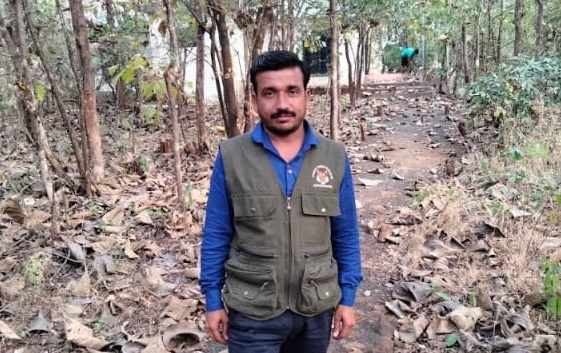Deepak speaks to us about his field experiences from Melghat Tiger Reserve where he works with communities and encourages them to get involved in conservation initiatives.
- Tell us more about yourself and what got you interested in working for the environment.
I come from a village in Melghat and had a keen interest in the environment since my school days. My family is from the herder community that engages in cattle care and dairy. Growing up, I wanted to become a doctor but due to financial constraints, I completed my education in the teaching field. Eventually, I met a member of the NCSA team who encouraged me to work for social development and conservation related work. In this way, I got introduced to NCSA’s Mobile Health Unit which provides primary healthcare to the local community living around Melghat Tiger Reserve and helps deliver the message of protecting the water, forests, the landscape, and wildlife. I would like to say that I too have understood the importance of conserving the environment through our NCSA health unit.
- How does a typical day unfold for you? Tell us a bit about your conservation work and what you love about your current job.
I feel every day is important and enriching in our work because our work involves spreading awareness about the importance of nature.
As a part of our work, I really like working on understanding the issues of the local community and thinking about different ways of solving these challenges.
- Could you share a key learning or experience from the field.
One particular incident comes to mind. Our work includes many different initiatives like medical camps, education camps, wildlife conservation initiatives, etc. During these, we observe human – wildlife conflict issues among many local community members but we try to work towards transforming that conflict or struggle into love. We face a lot of challenges while doing so. One particular day, a sloth bear came close to a village area and started feeding on some berries. This sloth bear had also suffered an injury on its foot. The local villagers observed this and instead of getting alarmed and informing the forest officers, they informed our team about this incident and requested us to help and treat the injured bear.
Through this incident, we observed that the objective with which we are working, and the message that we are trying to spread, is being positively received by the community and the anger towards wildlife is slowly reducing.
- Do you feel optimistic about the future of the natural environment of India. Have you experienced a positive change regarding conservation in your area?
I feel very hopeful about the future of the environment of India. In the Hindi language, the environment is called ‘Paryavaran’ . This means all living beings including plants, animals, and human beings, and the physical complex associated with them are called the environment. Due to limitless progress and competition for new inventions, today, humans want to completely conquer nature and the balance of nature has been disturbed. Environmental protection is closely related to the survival of all living beings and the entire natural environment of this earth. Hence during the 2002 Earth Summit in Johannesburg, many measures were suggested to all the countries of the world to pay attention to environmental protection.
Moreover, one can observe positive change if activities that are detrimental to the environment are regulated. For example, during the Covid-19 induced lockdown, many activities like sand and stone mining in biodiversity-rich areas had reduced considerably along with a reduction in pollution, vehicular movements, and roadkills. From meteorologists to environmental experts, this positive change was acknowledged by many.

